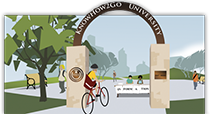Success Stories
Javier
What motivated you to enter/return to college after your military service?
I decided to pursue my education after the death of my friend and fellow soldier, Sgt, Jesse Davila. We had talked about our plans after returning from Iraq, and I had told him of my lifelong goal of being an attorney. Once I returned from Iraq in 2006, I started at Park University with no college experience, and now I am in my first year of law school at Stetson University College of Law.
What did you hope to achieve out of your college experience?
I wanted to get through my undergraduate degree with the highest GPA possible, in order to be accepted to law school. I also wanted to immerse myself in different perspectives and opinions, in order to become a more reasonable and well-rounded person.
What was one of the most difficult aspects of entering college after your military experience?
The most difficult aspect was getting over the fear of being an outsider and an older student. I had been out of high school for so long that I had lost the confidence in my ability to study effectively and do well in the classroom.
What have the educational benefits of the GI Bill meant to you?
The GI Bill reduced the amount of debt that I have to pay back after my education is complete. I am happy to see the new GI Bill in place to address the cost of living expenses and the cost of books. If I had that available to me, my debt would be close to zero.
What is the biggest payoff of attending college after military service?
The biggest payoff is going to be the first veteran that I help give access to justice when I am a new attorney. Attending college has helped me tremendously in readjusting to civilian life.
What advice would you give to a member of the military who hopes to attend college after completing military service?
I would tell them to start as soon as possible and don't look back. Seek out the benefits and services they have earned, and that our brothers and sisters have died for us to obtain. Keep those who have sacrificed their lives for us close to their hearts and in their minds at all times, especially when times get hard and they feel like quitting. Pursue a degree in a field that helps others and allows you to keep serving others.
Laurie
What motivated you to enter/return to college after your military service?
I initially entered the work force after my military training. It wasn't long before I realized I wouldn't be able to live the life I had imagined without a college degree. So, the motivation has been finding a job I love and one that will allow me to live comfortably.
What did you hope to achieve out of your college experience?
I hoped to gain skills required to be successful in my career and in life.
What do you wish you had done differently throughout your college preparation process?
I wish I would've spent time understanding how I learn best, so I was better able to study for my classes.
What was one of the most difficult aspects of entering college after your military experience and why?
My experiences in the military forced me to grow up and take responsibility for my choices. It was this maturity that made fitting in with my peers difficult, at times. But, at the same time, I attribute much of my college success to this maturity.
How do you balance your work and family life going to college?
Because of the education benefits I received, I didn't need a job. However, I considered college my job and worked full-time in order to spend evenings and weekends with my family and friends. This balance kept me focused when it was time to work, but left me time to relax and have fun.
What have the education benefits of the GI Bill meant to you?
The education benefits I received as a member of the military allowed me the freedom to focus on my studies without the stress of wondering how I would pay my bills each month.
What is the biggest payoff of attending college after military service?
My college degree demonstrated my intelligence, while my military service was a testament to my character. Employers see me as the complete package for both reasons.
What advice would you give to a service member or veteran who hopes to attend college after completing military service?
I would advise any member of the military to simply take the leap and get back into school. The integrity, discipline, maturity, work ethic and time management skills that were learned (or strengthened) in the military are all very useful tools in the classroom. In many college situations, it will be these exact skills that catapult you to the top of your classes; not simply your intelligence alone.
Nate
What motivated you to go to college?
A lot of my friends from high school went to college, and it seemed like they had a great time. I always wanted the college experience that other people had.
I also did a lot of work with the elderly in high school, and with my medical training in the Marine Corps, I decided that caring for people who need extra help is what I wanted to do with my life. And I needed a college degree to do what I wanted in that field.
What did you hope to achieve out of your college experience?
I want a four-year degree eventually, but I'm not sure in what. Right now, I am taking classes at a community college, and I want to go into nursing. I have also put a lot of thought into becoming a physician's assistant.
What do you wish you had done differently throughout your college preparation process?
Starting out was hard; I didn't really know who to talk to. The information was really confusing, and there was so much of it. It wasn't until a VA representative gave me some direction, that I was really able to understand what I needed to do in order to use my GI Bill benefits, and get started on school.
What was one of the most difficult aspects about entering college after your military experience?
Definitely figuring out the GI bill, how it works and what it pays for! The whole process is confusing, but I was lucky to have VA reps that were willing to sit down with me and explain all of the details.
How do you balance your work and family life going to college?
I am able to use the GI bill to pay my rent and my tuition, so I don't need to have a job. That really helps me focus on school and my other interests, like spending time with my family and friends.
What have the educational benefits of the GI Bill meant to you?
The benefits have given me the resources to stay focused and stay on track. Having these benefits means a lot; they've given me the chance to do something I might not have done otherwise.
What is the biggest payoff of attending college after military service?
If I didn't join the Marine Corps, there was no way I would've succeeded in school. The Marines gave me discipline to sit down, do my work and do a good job. I believe that I have an advantage over other students, because I was in the military first. It gave me the ability to pay attention to detail.
What advice would you give to a service member or veteran who hopes to attend college after completing military service?
Look for other veterans who go to your college. They are your best resource. I really relied on word of mouth from other student veterans I trusted. If you have a problem, they probably had the same problem at some point, and figured out how to fix it.
Amariee
What motivated you to enter/return to college after your military service?
One of the main reasons I went into the military was to obtain money for college. When I separated from the military, I immediately enrolled in school. I researched all that I had to do and went in full-force.
What did you hope to achieve out of your college experience?
I hope to graduate for an accredited college with a BS in biology, and to gain knowledge so that I can get into a Master's or MD program.
What was one of the most difficult aspects of entering college after your military experience and why?
The most difficult thing was trying to understand what the college needed for my benefits to continue.
How do you balance your work and family life going to college?
I prayed a lot, and I tried to schedule my classes early in the week, so I could work on the weekends. I also tried to schedule morning and afternoon classes, so that my evenings were free as if I was working full-time.
What is the biggest payoff of attending college after military service?
Having military experience coupled with a degree gives you a great advantage. I have found that employers like that I have the discipline to be in the military, and they also like that I obtained my degree. It shows I have dedication in and out of the service.
What advice would you give to a member of the military who hopes to attend college after completing military service?
Find something that truly interests you. Use the benefits you have earned to do something meaningful. If it helps, and if you like what you did in the military, get a degree in that subject or field. Experience plus knowledge goes a long way.
Matt
What motivated you to enter/return to college after your military service?
I was trying to make my way professionally, and realized that there was a ceiling for my advancements and pay possibilities if I didn't have a degree. I was pushed by several of my friends - veterans and non-veterans - who thought I wasn't living up to my potential.
What did you hope to achieve out of your college experience?
I wanted to enjoy and experience as much of the normal college experience that is available to me. I wanted to know that my service postponed my time in college, not replaced it.
What do you wish you had done differently throughout your college preparation process?
I wish I had better understood how the benefits worked and what my choices were. I may have gone about things differently and saved them while I was in community college.
What was one of the most difficult aspects of entering college after your military experience?
For me, the most difficult part was the maze of paperwork and bureaucracy involved in admittance, registration and benefit activation/certification. Then, there was the challenge of being so out of place socially on campus; in class, it caused me a lot of stress and anxiety.
How do you balance your work and family life going to college?
Making school a priority is half the battle. Then, you have to use the time-management skills you acquired in the military. You will find that staying ahead of assignments and class work allows you flexibility when family situations arise.
What have the educational benefits of the GI Bill meant to you?
Honestly, they have meant everything. I am able to pursue my degree, which is something I didn't think possible two years ago. I am living the dream, enjoying the experience and investing in myself. Without these benefits, I am not sure any of it would be possible.
What is the biggest payoff of attending college after military service?
Selfishly, it is the pride and satisfaction I have in my accomplishments. I know I am doing the right thing and making my future brighter. I am also honoring the lives of my brothers and sisters who didn't make it home by living my life to its fullest potential.
What advice would you give to a service member or veteran who hopes to attend college after completing military service?
Take advantage of the services available to you while you are still in. Make contact with the student veteran club and VA official on your campus ahead of time, so you know what you need to do to make your transition as smooth as possible. Attend an orientation. They seem silly, but are full of information. Commit to college. Don't treat it as an afterthought. Get involved. Find a club, organization, fraternity or something that interests you on campus. College is as much a social experience as it is an academic one.
Mike
What motivated you to enter/return to college after your military service?
As a disabled veteran with a traumatic brain injury, I have found that education is an extremely effective form of mental therapy. If you push yourself, your mind will respond. I refused to be that injured veteran who has little to offer society.
What did you hope to achieve out of your college experience?
I wanted to help educate and train our nation's veterans, as education has done so much for me as a disabled veteran.
What do you wish you had done differently throughout your college preparation process?
I wish I had spent more time with other, educated veterans.
What was one of the most difficult aspects of entering college after your military experience and why?
The most difficult thing for me was to begin thinking like a professor. You have to remember most professors are not veterans and most veterans are not professors. We are two very different groups.
What have the education benefits of the GI Bill meant to you?
Education benefits are the public's way of saying we believe enough in you to sacrifice our money and time to ensure you're educated. So use them!
What is the biggest payoff of attending college after military service?
Knowing that you have the education to continue providing for your family in future, regardless of the condition of the economy, is a great feeling.
What advice would you give to a service member or veteran who hopes to attend college after completing military service?
As the southeast regional director of the Student Veterans Association, I would say this: get enrolled in one our country's veteran-friendly campuses, find a student veteran support group, and then get motivated about having a career, not just a job.





